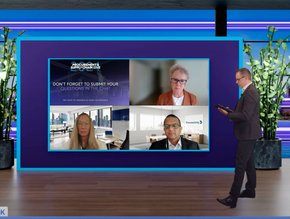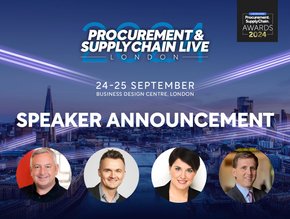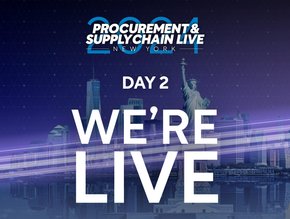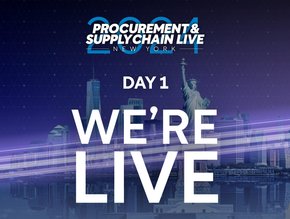Ricoh & P&O on the Challenges of Global Logistics
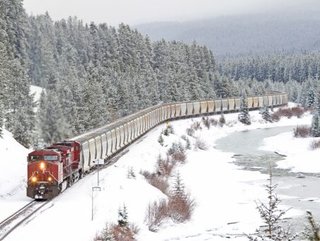
Global logistics is a complex, multi-stage process for managing the flow of goods internationally, typically from the place of manufacture to the place of consumption.
Take your humble loaf of bread. The global logistics involved in getting the wheat from point of growth into your shopping trolly might involve shipping seeds and fertiliser to a grain farmer in Eastern Europe, sending harvested grain to a processing mill, trucking flour to an industrial bakery, sending containers of loaves to a distribution centre, and then onwards to the supermarkets.
Such a chain can involve the movement of goods by truck, train, ship or plane so-called multimodal logistics.
Here, we look at the global logistics challenges faced by a providers of logistics services, P&O Ferrymasters, and one of its multinational clients, Ricoh.
John Freyne (JF) is Director of Intermodal at P&O Ferrymasters. P&O Ferrymasters is one of Europe’s leading providers of multimodal transportation and logistics. It offers a pan-Europe short–sea, road, and rail network, plus access to the global logistics clout of parent company, DP World.
Its customers include some of the world’s largest FMCG companies, carmakers, agricultural producers, retailers, and manufacturers. One of its clients is Ricoh, the Japanese multinational imaging and electronics company. Martijn Spee (MS) is Manager of Transport at Ricoh Europe.
Below, Freyne and Spee share insights on the challenges involved in managing the global flow of goods.
What’s the biggest challenge of a global logistics network?
JF: For P&O Ferrymasters, the biggest challenges are trading balances and volume volatility.
MS: I think the biggest challenge for Ricoh is the geopolitical landscape, which is undeniably impacting supply chains across the world.
How do you look to meet this challenge?
JF: At P&O Ferrymasters, we have put a big emphasis on ‘co-creation’ to help meet these challenges. We do this by finding and making the right connections between the supply streams of different customers, to boost efficiency and enhance modal shift.
To put it simply, if we see that two of our customers are moving freight on the same corridor, we’ll make the connection. This of course extends to moving the cargo by rail instead of road.
MS: Ricoh overcomes this challenge largely by maintaining agile and adaptable solutions for our customers.
While some businesses may panic during times of market uncertainty, we respect that volatility is a normal part of doing business within the global supply chain.
That is why we have a history of long-term partnerships, such as P&O Ferrymasters, which helps us stay quick on our feet and create different flows for different customers, regardless of market volatility.
What are the challenges of moving from haulage to rail freight?
JF: The biggest challenge is the lack of a unified European strategy towards rail freight. Individual national approaches to rail freight – with different rules and obligations – is making rail freight difficult to manage. To help overcome that, I would like to see a pan-European approach to modal shift and a prioritisation of rail freight, to make it as efficient and seamless as any other mode of transport.
(Editor’s note: ‘Modal shift’ is the change from one form of transportation to another – from road to rail, or delivery truck to e-cargo bike. It is an important element of creating more sustainable transport systems.)
MS: Choosing to move freight by rail instead of road is never without its challenges. Construction works, rail maintenance, and strikes can sometimes cause issues along the supply chain, but given our operation
What benefits does rail deliver?
JF: The environmental and operational benefits of rail freight and modal shift are clear. By moving cargo via rail, this has increased our capacity for handling goods whilst reducing carbon emissions. Additionally, switching from road haulage to rail freight reduces the reliance on heavy goods vehicles.
MS: Ricoh’s aim is to share our goods in the most sustainable way possible across long distances throughout Europe. To do that, rail still is by far the most sustainable method.
When you pair modal-shift-up with transitions to alternative energies such as hydrotreated vegetable oil and electricity, the operational sustainability benefits are obvious.
How are you cutting carbon emissions of your global logistics operations?
JF: There is no single ‘best’ solution to cutting carbon emissions. While we are committed to our modal-shift initiative, we are also currently looking at implementing ‘green’ solutions to further improve our operations, such as HVO or e-trucks for the first and last mile.
We are constantly working with Ricoh to find even more sustainable solutions. One example is our double-decker trailers, which allow Ricoh to double the loading capacity on a single loading unit.
MS: We always look at our procurement processes as a way to ensure that our sustainability priorities and initiatives align with that of our customers.
We constantly challenge our supply chain partners about their environmental objectives, allowing us to develop and distil the right service for each customer.
What is the secret to a successful global logistics partnership?
JF: I would say focusing on long-term relations and building trust is the best way to create a successful partnership. Being able to identify, analyse and offer the right market solutions and operations in the long term alongside Ricoh has been crucial for our pricing and servicing.
MS: I feel that the key to a successful partnership is developing mutual benefit for all parties and building trust.
The long-term aspect to our partnership is also important, as P&O Ferrymasters understand our logistics needs, again building on that adaptability point I mentioned earlier.
Organisations may choose a short-term strategy and go for cheap trading options, but they will never be as efficient as we are because they lack the long-term relationship that efficiency requires.
******
Make sure you check out the latest edition of Supply Chain Digital and also sign up to our global conference series - Procurement & Supply Chain 2024
******
Supply Chain Digital is a BizClik brand

